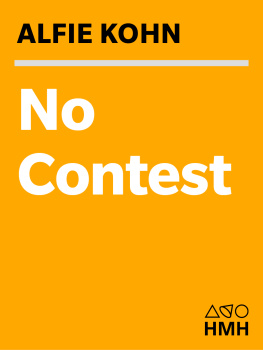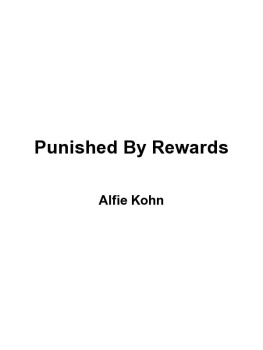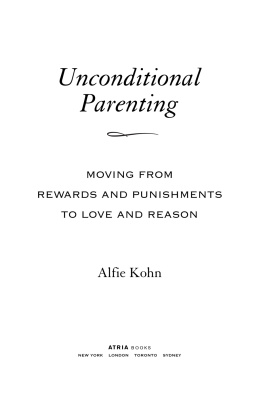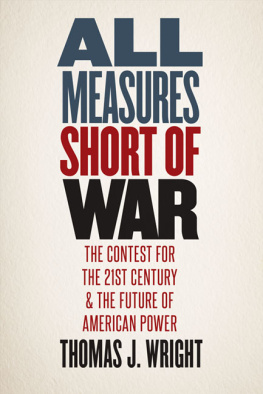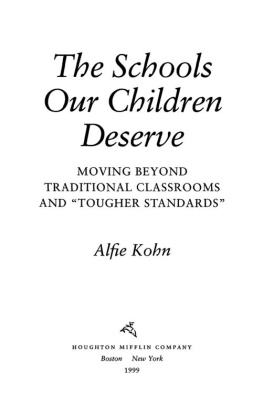Alfie Kohn - No Contest: The Case Against Competition
Here you can read online Alfie Kohn - No Contest: The Case Against Competition full text of the book (entire story) in english for free. Download pdf and epub, get meaning, cover and reviews about this ebook. City: United States, year: 2013, publisher: Houghton Mifflin Harcourt Publishing Company, genre: Politics. Description of the work, (preface) as well as reviews are available. Best literature library LitArk.com created for fans of good reading and offers a wide selection of genres:
Romance novel
Science fiction
Adventure
Detective
Science
History
Home and family
Prose
Art
Politics
Computer
Non-fiction
Religion
Business
Children
Humor
Choose a favorite category and find really read worthwhile books. Enjoy immersion in the world of imagination, feel the emotions of the characters or learn something new for yourself, make an fascinating discovery.
- Book:No Contest: The Case Against Competition
- Author:
- Publisher:Houghton Mifflin Harcourt Publishing Company
- Genre:
- Year:2013
- City:United States
- Rating:4 / 5
- Favourites:Add to favourites
- Your mark:
- 80
- 1
- 2
- 3
- 4
- 5
No Contest: The Case Against Competition: summary, description and annotation
We offer to read an annotation, description, summary or preface (depends on what the author of the book "No Contest: The Case Against Competition" wrote himself). If you haven't found the necessary information about the book — write in the comments, we will try to find it.
No Contest stands as the definitive critique of competition. Contrary to accepted wisdom, competition is not basic to human nature; it poisons our relationships and holds us back from doing our best. In this new edition, Alfie Kohn argues that the race to win turns all of us into losers.
No Contest: The Case Against Competition — read online for free the complete book (whole text) full work
Below is the text of the book, divided by pages. System saving the place of the last page read, allows you to conveniently read the book "No Contest: The Case Against Competition" online for free, without having to search again every time where you left off. Put a bookmark, and you can go to the page where you finished reading at any time.
Font size:
Interval:
Bookmark:
Copyright 1986, 1992 by Alfie Kohn
All rights reserved
For information about permission to reproduce selections from this book, write to Permissions, Houghton Mifflin Harcourt Publishing Company, 215 Park Avenue South, New York, New York 10003.
www.hmhco.com
The Library of Congress has cataloged the print edition as follows:
Kohn, Alfie.
No contest : the case against competition / Alfie Kohn.
Rev. ed.
p. cm.
Includes index.
ISBN 978-0-395-63125-6
1. Competition (Psychology) 2. Cooperativeness. 3. Aggressiveness (Psychology) 4. Social interactionUnited States. I. Title.
HM 291. K 634 1992
302'.14dc20 92-26141
CIP
eISBN 978-0-547-52739-0
v1.1113
The author is grateful for permission to use excerpts from:
Success Anxiety in Women by Georgia Sassen in Harvard Educational Review, February 1980, 50:1. Copyright 1980 by the President and Fellows of Harvard College. All rights reserved.
Mama Told Me Not to Come by Randy Newman. Copyright 1966 by January Music Corp. Assigned to Unichappell Music, Inc. International Copyright Secured. All Rights Reserved. Used by permission.
Books and articles quoted or cited in the text under the usual fair use allowances are acknowledged in the notes and references.
For almost every person who writes a book, there is a circle of friends, relatives, and (if the author is sufficiently preoccupied with the project) even casual acquaintances who have been subjected to conversation about it. A well-known writer once turned me down for an interview, claiming he didnt like to talk about whatever he was working on at the time lest his energies be drained. This still baffles me. For the last ten years, Ive been eager to talk about competition with anyone who spoke English. The many discussions that resulted have refined my thinking on the subject immeasurably, and Im grateful to those who have listened and questioned and argued. The same goes for those who spoke up after more formal talks Ive given in the Boston area and for my students at Tufts University and the Cambridge Center for Adult Education who wrestled with the topic for an entire semester. No one had to put up with more than those who live (or have lived) in the cooperative house I lived in for five years: Carol Hetrick, Phil Korman, Ellen Carlino, Marianne Takas, Jeb Brugmann, Claudia Cahan, Bob Irwin, Carol Dirga, Don Bishop, and Lynne Weiss.
My interest in competition can be understood in this context: I am fascinated by questions that seem basic to being human, that address us as whole persons rather than just as disembodied intellects, and that cannot be dealt with adequately within the confines of a single academic discipline. That I have such an orientation is due largely to two people: Rob Beneckson awakened it, prodding me to start reading in psychology and helping me to read critically. George Morgan shaped it, becoming for me a mentor in the best sense of that wordand, later, a treasured friend.
My original plan was to edit a collection of essays on competition, but it wasnt long before I realized I had a lot more to say than could be contained in an introduction. While I was trying to say it, I pressed drafts of chapters on people whose judgment I valued, hoping for critical readings. I was not disappointed, and I am pleased to thank Laura Schenk, Claire Baker, Phil Korman, Stewart and Estelle Kohn, Susan Hewitt, Marianne Takas, and Georgia Sassen, all of whom helped me to reach a much-needed sense of perspective in addition to suggesting revisions large and small. Ive learned about cooperative learning from a number of people since the first edition of this book was published; if I mention only Eric Schaps and David Johnson, its because they were kind enough to read and comment on my new chapter that deals with the topic. (Alisa Harrigan did so, too, but she has my gratitude for a lot more than that.)
Bill Greenes contribution merits a separate paragraph. In view of his agile intelligence, I would have been happy with even a small helping of his help. I was lucky enough to receive more hours than I can count: he read every chapter, said a great deal about themall of it usefuland forced me to rewrite and rethink much of what follows. Whatever you think of this book, it is far better than it would have been without his help. The legal profession is lucky to have him.
With all of this advice and guidance, it would have been a shame to keep the final product all to myself. This is where Larry Kessenich and John Ware came in. Their enthusiasm for the project is responsible for turning it into a published book. I have not only Larry but also Ruth Hapgood, Lois Randall, and Gerry Morse to thank for editing, as well.
Let me note, finally, that most of the research for this book was done in the libraries of Harvard University, the size of whose holdings is matched only by the schools determination to restrict access to them. I am delighted to have been able to use these resources, and it hardly matters that I was afforded this privilege only because the school thought I was someone else.
At every quarterly examination a gold medal was given to the best writer. When the first medal was offered, it produced rather a general contention than an emulation and diffused a spirit of envy, jealousy, and discord through the whole school; boys who were bosom friends before became fierce contentious rivals, and when the prize was adjudged became implacable enemies. Those who were advanced decried the weaker performances; each wished his opponents abilities less than his own, and they used all their little arts to misrepresent and abuse each others performances.
Robert Coram, Political Inquiries (1791)
Life for us has become an endless succession of contests. From the moment the alarm clock rings until sleep overtakes us again, from the time we are toddlers until the day we die, we are busy struggling to outdo others. This is our posture at work and at school, on the playing field and back at home. It is the common denominator of American life.
Precisely because we are so immersed in it, competition can easily escape our notice. A fish does not reflect on the nature of water, Walker Percy once remarked, he cannot imagine its absence, so he cannot consider its presence. Even those who think and write for a living have paid surprisingly little attention to the subject. In the last fifty years, for example, no one has written a book that explores the very idea of competition and the way it plays itself out in all the varied arenas of human life. I do not mean a lament about what has happened to sports today or a recipe for being a winner in business or a statistical operation performed on abstractions that issue from experimental games. These roll off the presses regularly. I mean a look at what it really means to try to beat other people, a careful investigation of this arrangement that requires some people to fail in order that others can succeed.
If such an analysis is long past due, the need for it is nowhere more urgent than in this country. Different cultures depend on competition to different degrees in structuring their economic system or schooling or recreation. At one end of the spectrum are societies that function without any competition at all. At the other end is the United States. Here is social psychologist Elliot Aronson:
Others have used similar language. Competition is almost our state religion, says one observer.
This does not mean that competition is found only in the United States. The examples offered in this book will likely seem familiar to readers elsewhere. But what may be merely familiar in other places has reached exaggerated, often ludicrous, proportions in this country. We can see this both in the pervasiveness of competitive activities and in the fervor with which we approach them. Our economic system is predicated on competition, while our schooling, from the earliest grades, trains us not only to triumph over others but to regard them as obstacles to our own success. Our leisure time is filled with highly structured games in which one individual or team must defeat another. Even within the family there is rivalrya muted but often desperate struggle that treats approval as a scarce commodity and turns love into a kind of trophy.
Next pageFont size:
Interval:
Bookmark:
Similar books «No Contest: The Case Against Competition»
Look at similar books to No Contest: The Case Against Competition. We have selected literature similar in name and meaning in the hope of providing readers with more options to find new, interesting, not yet read works.
Discussion, reviews of the book No Contest: The Case Against Competition and just readers' own opinions. Leave your comments, write what you think about the work, its meaning or the main characters. Specify what exactly you liked and what you didn't like, and why you think so.

